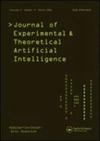快速耦合变分推理
IF 1.7
4区 计算机科学
Q3 COMPUTER SCIENCE, ARTIFICIAL INTELLIGENCE
Journal of Experimental & Theoretical Artificial Intelligence
Pub Date : 2021-01-15
DOI:10.1080/0952813X.2021.1871970
引用次数: 2
摘要
建立在完全分解基础上的平均场变分推理可以有效地求解;但是,它忽略了潜在变量之间的依赖关系,从而导致性能降低。为了解决这个问题,提出了copula变分推理(CVI)方法,利用已建立的copula有效捕获后验依赖,从而获得更好的近似。然而,它有一个计算问题,对具有大量潜在变量的大型模型进行优化非常耗时。这主要是由于在CVI中形成有噪声的蒙特卡罗梯度时,采样成本较高。为了加速CVI,本文提出了一种新型的快速CVI(简称FCVI)。在FCVI中,我们通过平均场分解的期望推导出CVI目标的梯度。因此,我们可以从维平均场分解中获得更有效的采样,从而将采样复杂度降低到。为了评估FCVI,我们将其与建模性能和运行时间的基线方法进行比较。实验结果表明,FCVI与CVI相当,但运行速度快得多。本文章由计算机程序翻译,如有差异,请以英文原文为准。
Fast copula variational inference
ABSTRACT Mean-field variational inference, built on fully factorisations, can be efficiently solved; however, it ignores the dependencies between latent variables, resulting in lower performance. To address this, the copula variational inference (CVI) method is proposed by using the well-established copulas to effectively capture posterior dependencies, leading to better approximations. However, it suffers from a computational issue, where the optimisation for big models with massive latent variables is quite time-consuming. This is mainly caused by the expensive sampling when forming noisy Monte Carlo gradients in CVI. For CVI speedup, in this paper we propose a novel fast CVI (abbr. FCVI). In FCVI, we derive the gradient of CVI objective by an expectation of the mean-field factorisation. Therefore, we can achieve a much efficient sampling from the -dimensional mean-field factorisation, enabling to reduce the sampling complexity from to . To evaluate FCVI, we compare it against baseline methods on modelling performance and runtime. Experimental results demonstrate that FCVI is on a par with CVI, but runs much faster.
求助全文
通过发布文献求助,成功后即可免费获取论文全文。
去求助
来源期刊
CiteScore
6.10
自引率
4.50%
发文量
89
审稿时长
>12 weeks
期刊介绍:
Journal of Experimental & Theoretical Artificial Intelligence (JETAI) is a world leading journal dedicated to publishing high quality, rigorously reviewed, original papers in artificial intelligence (AI) research.
The journal features work in all subfields of AI research and accepts both theoretical and applied research. Topics covered include, but are not limited to, the following:
• cognitive science
• games
• learning
• knowledge representation
• memory and neural system modelling
• perception
• problem-solving

 求助内容:
求助内容: 应助结果提醒方式:
应助结果提醒方式:


